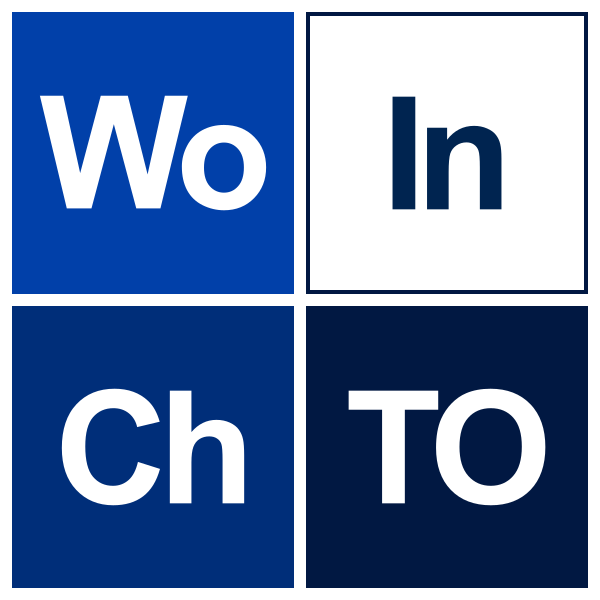November 2022
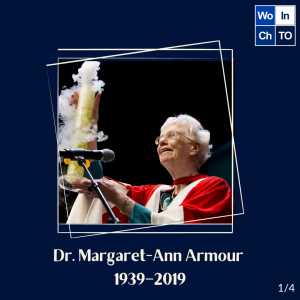
Dr. Margaret-Ann Armour (1939–2019)
Dr. Armour was a chemist based at the University of Alberta. Raised in Scotland, she completed both her Bachelor and Master of Science degrees at the University of Edinburgh. She then moved to Canada to complete her doctoral work in organic chemistry at the University of Alberta (PhD 1970) before moving back to Scotland for a post-doctoral fellowship at the University of Edinburgh.
Dr. Armour joined the chemistry department at the University of Alberta in 1979, at which time she was one of the only female faculty members. She went on to serve as the Assistant Chair from 1989 to 2005, and then as the University’s first Associate Dean of Science for Diversity from 2005 to 2019. Recognized worldwide for her leading-edge research in proper handling and disposal of hazardous waste, she is equally esteemed for championing women in the sciences. In 1982, she founded WISEST (Women in Scholarship, Engineering, Science, and Technology), one of the first organizations in Canada purposed to empower women to pursue, impact, and succeed in the sciences. In the years that followed, she became an internationally renowned advocate for diversity and an ambassador for women in the sciences everywhere through her tireless volunteering, mentorship, and leadership.
Over the course of her life, Dr. Armour received numerous accolades for her research and outreach activities, such as a 3M teaching fellowship, the Montreal Medal, and twice being named as one of the top 100 most powerful women in Canada by the Executive Women’s Network. She was also named a member of the Order of Canada in 2006, as well as a Canada 150 Ambassador for the country’s 150-year centennial celebrations in 2017. Despite her passing in 2019, her commitment to equity and inclusiveness continues to inspire meaningful change in the scientific community within Canada and around the world.
You can discover more about Margaret-Ann’s incredible legacy through Shining Armour, a 2020 documentary commemorating her contributions to science, as well as a 2021 Canadian Journal of Chemistry article highlighting the impact of WISEST.
October 2022
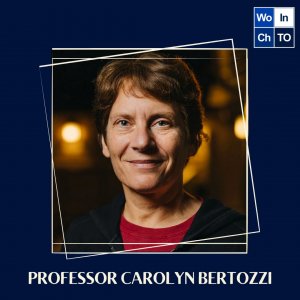
Prof. Carolyn R. Bertozzi (October 1966 - Present)
Prof. Bertozzi is a Professor at Stanford and one of this year’s recipients of the Nobel Prize in Chemistry, known for her wide-ranging work spanning both chemistry and biology. She invented the field of “bioorthogonal chemistry,” which allows researchers to chemically modify molecules within living systems. This approach is now used to study molecules such as proteins, DNA, and RNA in live cells, and has the potential utility as a drug delivery system for cancer therapeutics.
Carolyn received her PhD in Chemistry at University of California, Berkeley with Mark Bednarski, working on the chemical synthesis of oligosaccharide analogs. She then went on to complete a postdoc at University of California, San Francisco with Steven Rosen, where she studied the activity of endothelial oligosaccharides in promoting cell adhesion at inflammation sites. She has received numerous awards for her work, including the MacArthur Foundation Fellowship, ACS Award in Pure Chemistry, Wolf Prize, and Welch Award in Chemistry, to name a few. She was also the first woman to receive the prestigious Lemelson-MIT PRize faculty award. As an open lesbian in academia and science, Bertozzi has and continues to be a role model and inspiration for students and colleagues.
You can find out more about Prof. Bertozzi’s research group here: https://bertozzigroup.stanford.edu
Twitter: @CarolynBertozzi
September 2022
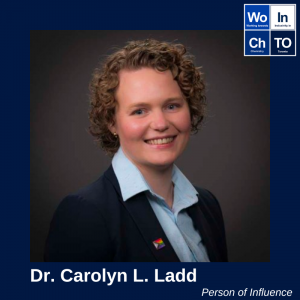
Dr. Carolyn L. Ladd (? - Present)
Dr. Carolyn L. Ladd has been a senior research specialist at Dow since January 2020. Carolyn completed their Masters and PhD at the University of Montreal under the supervision of Prof. André Charette, working on asymmetric catalysis and C-H activation. During Carolyn’s post-doc, they worked with Prof. Sarah Reisman at Caltech exploring the synthesis of ryanoid analogues. Ladd is currently working on developing sustainable technology at Dow with acrylates and serves as the site implementation lead for GLAD, Dow’s employee resource group for LGBTQ+ and ally employees. Carolyn is passionate about activism and volunteers with Thrive Lifeline, which is a grassroots organization dedicated to providing mental health support for individuals with intersecting marginalized identities. Carolyn has been recognized as a C&EN Trailblazer for 2022, won an Out & Equal Diverse Leaders Fellowship while working with DOW and received an FRQNT postdoctoral fellowship during their time at Caltech. Check out Ladd’s interview in this C&EN issue as well as their Twitter @DrCarolynLLadd.
June 2022
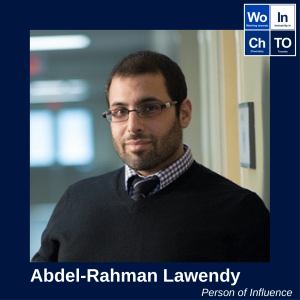
Abdel-Rahman Lawendy (? - Present)
Dr. Lawendy is an Associate Professor in Surgery at the University of Western Ontario, clinical chief of the orthopedic trauma unit, post-graduate chair of the Masters of surgery program, medical chief of London Health Sciences Center, and regional director in the Royal College of Physicians and Surgeons. Considering his clinical practice, Dr. Lawendy focuses on lower extremity reconstruction and is recognized as an international expert in compartment syndrome, a traumatic disease that leads to loss of limb or life. His research, funded by several major grant agencies, is currently investigating medical therapies to reduce the risk of tissue injury caused by compartment syndrome, including the use of carbon monoxide.
Dr. Lawendy completed his HSBc at the University of Waterloo before coming to Western to complete his medical degree (2003), residency in surgery (2008), and PhD in medical biophysics (2014). Additionally, Dr. Lawendy is an avid volunteer surgeon, working in conflict and combat zones since he was 18 years old. His first humanitarian mission was in 1994, during Bosnian war as a United Nations sponsored initiative. This was followed by fund raising project for Mercy International, front-line care after an earthquake in Pakistan in 2005, joining the international medical team for the 2009 Gaza Israeli attacks, and more recently, working with Doctors Without Borders to treat victims of violence in Yemen. Overall, Dr. Lawendy has shown decades of dedication to his craft through advancing the field, continuing his education, and participating in volunteer work.
You can find out more about Dr. Abdel-Rahman Lawendy at: https://www.schulich.uwo.ca/surgery/education/msc_in_surgery/faculty_accepting_graduate_students/dr_abdel-rahman_lawendy.html and read more about him at: https://www.schulich.uwo.ca/rapport/2015/alumni/making_change.html
May 2022
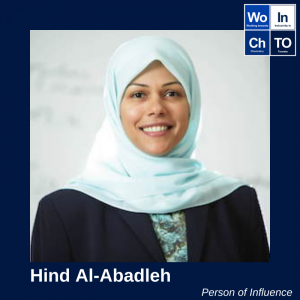
Hind Al-Abadleh (? - Present)
Hind Al-Abadleh is an Assistant Professor in the Department of Chemistry and Biochemistry at Wilfrid Laurier University, where her research group studies the physical chemistry of environmental interfaces commonly found in atmospheric and soil environments using infrared spectroscopy and other surface sensitive techniques. She grew up in the United Arab Emirates, where she first became interested in chemistry in high school. She then moved to the U.S. to complete her PhD at the University of Iowa under the supervision of Prof. Vicki Grassian, where she was awarded the University of Iowa Dissertation Prize in Mathematics, Physical Sciences, and Engineering. She then went on to complete a postdoctoral position at Northwestern University with Prof. Franz Geiger from 2003- 2005, before beginning her academic career at Wilfrid Laurier.
In addition to her research, Professor Al-Abadleh was a co-founding member of the CSC Working Group on Inclusion, Diversity, and Equity (WIDE), and is currently the Chair of the CIC Environment Division. She recently won the Gilead Award for Excellence in Equity, Diversity, and Inclusion from the Canadian Society for Chemistry as recognition of her excellence in work in equity, diversity, and inclusion initiatives. Her EDI work is vast and impressive, including initiatives that (1) promote the recruitment, retention, advancement of under-represented groups in chemistry and professional groups, (2) guide the educational and professional development of high school and university students, and early career researchers above and beyond the typical training in a research lab or a chemistry classroom, and (3) mobilize knowledge from environmental science to media, school boards, youth, and senior citizen groups from different ethnic groups and religious backgrounds in English and Arabic.
You can find out more about Prof. Hind Al-Abadleh’s research group by checking out https://www.wlu-science-chem-halabadleh.ca.
April 2022
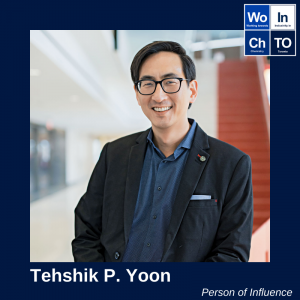
Tehshik P. Yoon (? - Present)
Tehshik is a professor in the Department of Chemistry at UW-Madison. Canadian-born, Tehshik completed his BA at Harvard University, his MSc from Caltech in 1998 under the supervision of Erick Carreira, and completed his PhD at Caltech in 2002 under the supervision of David MacMillan. As a postdoc, Tehshik returned to Harvard and investigated the use of hydrogen bonding urea catalysts in asymmetric synthesis. Since 2005, Tehshik's research group at UW-Madison has been studying the application of open-shelled reactive intermediates such as heteroatom-centered radicals, alkene radical cations, and electronically excited organic triplets to complex molecule synthesis. He has received numerous accolades including the Camille Dreyfus Teacher-Scholar Award (2010), NSF CAREER Award (2007), and most recently the American Chemical Society Cope Scholar Award (2019). Tehshik identifies as a gay chemist and recently wrote about celebrating LBGTQ+ chemists in this C&EN issue. You can check out his lab on Twitter @uwyoongroup
March 2022
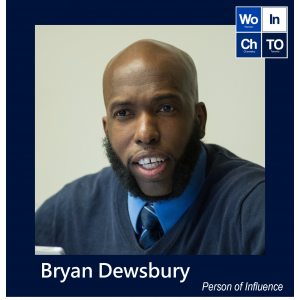
Brian Dewsbury (? - Present)
Prof. Dewsbury is an Associate Professor in Biology at Florida International University and the Associate Director of the STEM Transformation Institute. His research program focuses on social and equity questions in the context of discipline-based education research. His group looks at the role that bias, stereotypes, and identity constructs play in relationships from K-12, and how those relationships affect student engagement and learning outcomes.
Prof. Dewsbury was born and raised in Trinidad and Tobago and completed his BS in Biology at Morehouse College and his MS and PhD at FIU in Ecosystem Ecology. At FIU, he explored marine ecology and ecological economics and developed numerous teaching approaches and programs related to social belonging and higher education. Previously, he was a Professor at the University of Rhode Island for 7 years and was co-director of URI MARC. He is a Gardner Institute Fellow where he assists institutions of higher education cultivate best practices in inclusive education.
You can find out more about Prof. Dewsbury’s research at: http://www.seasprogram.net/ and follow him on twitter @BMDewsbury. Check out his faculty office hour from URI at https://www.youtube.com/watch?v=8RBxgDJdQZ4.
February 2022
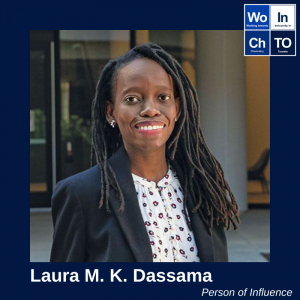
Laura M.K. Dassama (? – Present)
Prof. Laura M.K. Dassama is an assistant professor of Chemistry and Stanford ChEM-H Institute Scholar. Prof. Dassama earned her PhD in Biochemistry and Molecular Biology at Pennsylvania State University in 2013 under the mentorship of Profs. Marty Bollinger and Carsten Krebs. She then completed her postdoctoral training in Molecular Biosciences at Northwestern University with Prof. Amy Rosenzweig. She has also worked as a Research Associate in the laboratory of Dr. Stuart Orkin at Boston Children’s Hospital, Harvard Medical School, and Dana-Farber Cancer Institute.
Prof. Dassama’s current research is at the chemistry-biology interface, using chemistry principles to explain biological phenomena. She was diagnosed with sickle cell anemia as a child and now one of the research directions of her laboratory focuses on leveraging structural biology to discover potential therapies to help treat sickle cell disease.
You can find out more about Professor Dassama’s research group at https://www.dassamalab.org/ and follow her on twitter @lmkdassama. C&EN has also highlighted her incredible research at https://bit.ly/3dzvM4f.
